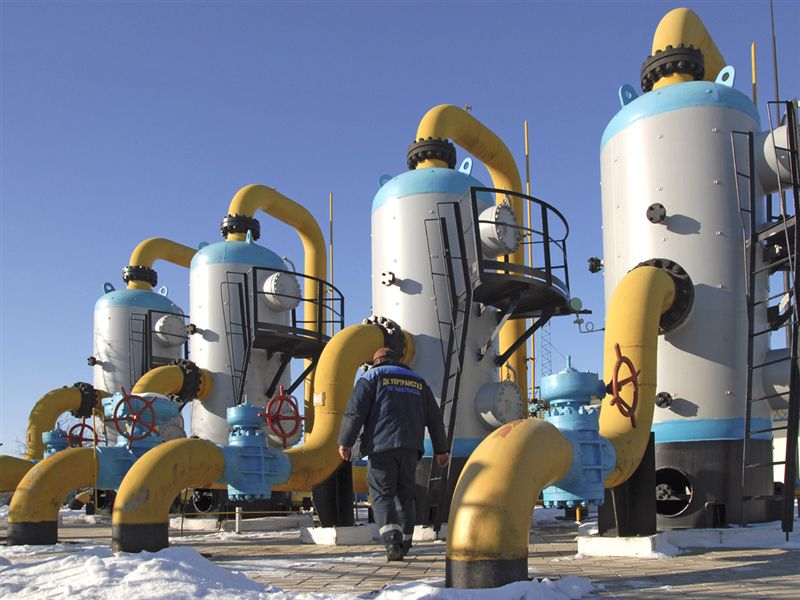
Ukraine Readies to Resume Buying EU Gas
Publication: Eurasia Daily Monitor Volume: 11 Issue: 49
By:

Ukraine’s newly appointed energy minister, Yury Prodan, is scheduled to discuss in Brussels on March 19 the resumption of natural gas imports from the European Union, as well as the launch of reverse gas flows from Slovakia (https://economics.unian.net/energetics/893257-prodan-19-marta-poedet-v-bryussel-govorit-o-reverse-gaza.html). The decision is predicated on the expectation that Russia will cancel its recent gas price discount to Ukraine by April 1, as well as by Russian threats to stop gas deliveries entirely.
On January 1, Gazprom cut its price for the Ukrainian national oil and gas company, Naftohaz Ukrainy, to $268.50 per 1,000 cubic meters of gas from the $392 that Ukraine paid last December. This was in line with agreements reached between the then-president Viktor Yanukovych and Russian leader Vladimir Putin on December 17, 2013. It was expected that Ukraine would pay off its debt for Gazprom’s gas deliveries from the second half of last year out of the $15 billion in loans, which Putin promised to Yanukovych (https://www.segodnya.ua/economics/enews/na-chto-ukraina-potratit-milliardy-ot-putina-484673.html). Ukraine collected the first $3 billion tranche of the Russian loan at the end of December, but never received the second tranche, which was expected in January. Later, Moscow made it clear that it was not going to disburse the remaining $12 billion, because it did not recognize the new Ukrainian government (https://lenta.ru/news/2014/02/25/storchak).
After Yanukovych fled Ukraine around February 22–23, Gazprom chief Alexei Miller told Russian Prime Minister Dmitry Medvedev that the discount for Naftohaz would be cancelled starting in April 2014 because Ukraine had paid only half of its debt for last year. Thereby, said Miller, Ukraine violated the December agreements (https://government.ru/news/10886). On March 7—the due date for Naftohaz’s debt to Gazprom for February deliveries—Miller announced that Ukraine failed to pay so its debt rose to almost $1.9 billion. Miller said Gazprom was under no obligation to deliver gas to Ukraine for free. He warned that the situation of January 2009, when Gazprom stopped gas deliveries to Ukraine due to a dispute over prices, could be repeated (https://itar-tass.com/ekonomika/1029097). Energy Minister Prodan admitted that Ukraine paid only $80 million out of the $440 million due to Gazprom for February (https://www.segodnya.ua/economics/enews/gazprom-poka-ne-otklyuchaet-gaz-ukraine-prodan-501883.html).
Ukraine has been taking measures to prevent gas shortages in the event of Russian cuts. Since the beginning of March 2014, Ukraine has been pumping more gas from Russia than usual in order to refill its underground gas storage facilities, which were nearly emptied during the winter (https://www.vzgliad.ru/economy/2014/3/3/675316.html). More importantly, Ukraine is going to resume gas purchases from the German company RWE, from which it bought 2 billion cubic meters (bcm) of gas last year. That gas was pumped through Poland and Hungary. Ukraine has also pinned high hopes on Slovakia, from which it can import 10 bcm or more of gas per annum (https://www.unian.net/society/872452-ukraina-podpisala-soglashenie-po-reversu-gaza-i-napravila-v-slovakiyu-stavitskiy.html). Despite resistance from Gazprom, on whose gas Slovakia depends, Ukraine came quite close last year to reaching an agreement with this Central European country to begin reverse flows of Russian gas to Ukraine. However, the plan was abandoned in December 2013, when Russia promised the gas price cut.
Now the situation is different, and Ukraine is again pinning its hopes on Slovakia. EU Energy Commissioner Guenther Oettinger announced on March 4 that the Slovakian government approved the decision to allow the reverse flow of natural gas to Ukraine via its pipelines. And the EU will help Ukraine to cut its dependence on Russian energy, Oettinger added (https://www.epravda.com.ua/rus/news/2014/03/4/424694/).
Gas from the EU will be more expensive than the current price Russia had offered to Ukraine late last year. Nevertheless, Kyiv expects that Gazprom will start charging a higher price of $368.50 per 1,000 cubic meters as of April 1 (https://kontrakty.ua/article/75179). That price is likely to be higher than average natural gas spot prices in Europe. Last year, when Gazprom charged Ukraine around $400, its price was regularly higher than European spot prices, and during those times Ukraine preferred to import RWE’s gas. Yet, if Russia cuts all gas deliveries through the Ukrainian pipeline system—most of which is earmarked for European customers—the resultant shortages this could cause in Central Europe would likely complicate or even completely undermine Ukraine’s plans to import natural gas from the West.
Still, judging by the most recent statement from Minister Prodan, the Ukrainian government is holding out hope that Russia will prefer to keep one of its most important customers rather than punish it for debt and disobedience. On March 12, Prodan said that Ukraine was going to buy 27–30 bcm of gas from Russia in 2014 (https://economics.unian.net/energetics/895531-ukraina-v-etom-godu-zakupit-okolo-27-30-mlrd-kubov-rossiyskogo-gaza.html). This is a bit more than Ukraine imported from Russia last year.
Even if Russia cuts gas deliveries now, Ukraine will not be as helpless as it was in January 2009, as the January–February peak of consumption is already behind it. Also Ukraine itself produces more than 20 bcm of gas per annum. This domestic production, combined with gas stored underground—some 32 bcm of gas can, in theory, be stored in the underground facilities in western Ukraine—is likely to suffice for Ukraine to survive at least until next fall. Ukraine consumed 50 bcm of gas last year, while importing 28 bcm—26 bcm of which came from Russia (https://mpe.kmu.gov.ua/minugol/control/uk/publish/article;jsessionid=0558BABBB19B98B207B8B01A69E23047?art_id=244907076&cat_id=35081). So although Moscow’s energy leverage over Kyiv remains formidable, it is gradually weakening.




